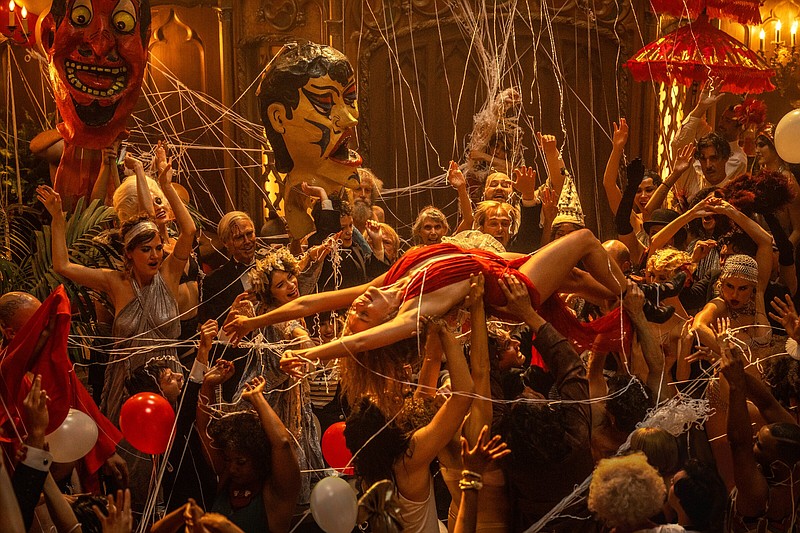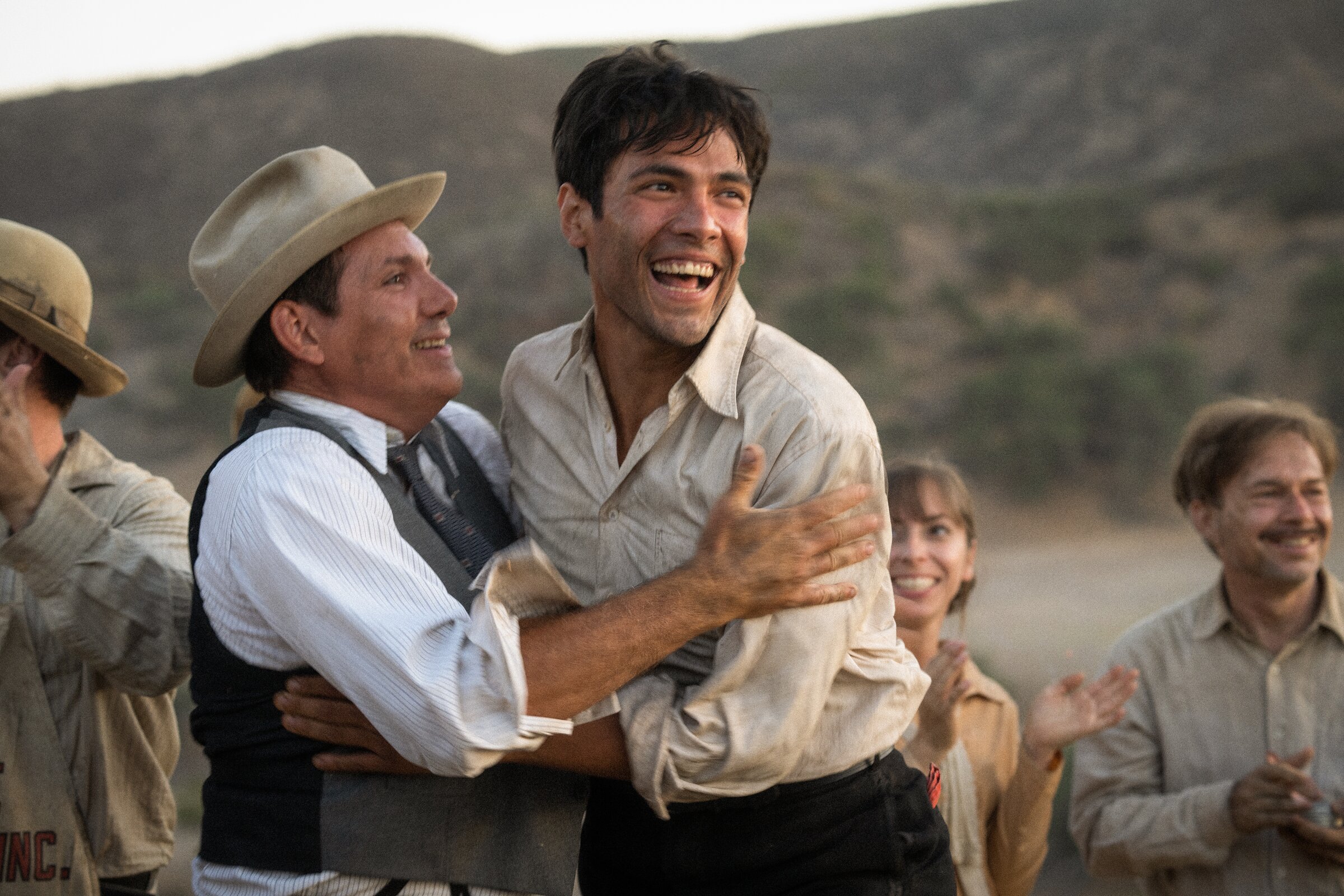In 1926, silent film superstar Jack Conrad (Brad Pitt) stumbles out of his trailer tent dressed as a Crusades-era king, somewhere in the barren hills outside L.A., where his studio has set up multiple makeshift productions all happening simultaneously. After a day spent drinking copiously, Conrad can barely stand under his own power, and requires a crewman to half-carry him to the "set," perched on top of a hill as a staged bloody war -- waged between two armies cast via the soup lines, it appears -- rages on below him in the background.
An actress is brought in, dressed in resplendent robes, a vision of purity and love that Conrad's character is meant to have conjured up from his battered subconscious. He staggers around, forcing down dry heaves, as the sun descends to its last glowing embers, the remaining light perilously close to being lost. But when his director, an irascible German, calls for action, Conrad suddenly snaps to attention, his face reflecting beatific love, as he embraces the woman, and they share a sweet, tender kiss, as war rages just behind them. Conrad has done it again, and the world will soon react as breathlessly as his director does upon calling "cut."
Jack might be a drunken sot, blazing his way through wives, gin rickeys, and movie productions at a dizzying pace, but there's a reason he's a star, it turns out. "You don't 'become' a star," young aspiring actress Nellie LaRoy (Margot Robbie), informs her new friend, Manny Torres (Diego Calva), outside a massive, Dionysian fete transpiring at the castle dwelling of a big-shot producer, "you either are one, or you ain't."
Damien Chazelle is a director who in the past has focused primarily on characters of tremendous self-control and discipline -- the obsessed Jazz teacher in his debut, "Whiplash"; Neil Armstrong in "First Man" -- so it's a bit jarring at first to witness him trying to capture the exact opposite of such tidy comportment. "Babylon" opens with a mad, free-for-all bacchanalia out in the desert, and it is by far the most hedonistic, lunatic vision Chazelle has ever committed to film.
...
That scene, shot a bit like a musical, with a swirling, lunging camera swooping from the upstairs rooms -- where a naked, heavy-set man lustily encourages a young starlet -- down to the central, writhing core of half-naked bodies gyrating and undulating to the up-tempo sounds of a blaring jazz band, led by trumpeter Sidney Palmer (Jovan Adepo), is the film's early pas de resistance. There, among a fusillade of balloons, flying debris, and, naturally, an elephant, the crowd whoops it up into an ever-building frenzy of excess.
Chazelle uses the hopped-up din and furor of the dance floor to introduce many of his primary characters: Manny has come primarily as the elephant wrangler, but soon catches the eye of several more prominent studio operators, and, more significantly, Conrad, who drives up with yet another soon-to-be ex-wife, and saunters into the hedonistic scene as if to the manner born. Meanwhile, gatecrasher Nellie makes a colossal splash by sneaking in and laying herself all over the dance floor (quite literally at one point, as she drops to the ground in a sort of swoon of ecstasy).
By the next morning, as the place is littered with bodies and empty bottles, Manny has been taken under Conrad's wing, and Nellie has been given a casting notice (to replace the unfortunate starlet upstairs, who has OD'd). They are all, it would seem, on their way.
Over the course of the film's next two and a half hours, Chazelle follows these early Hollywood denizens through their epic rises and obligatory falls: Conrad continues to rule the roost, right up until talkies are introduced at the turn of the decade, and then sees his star plummet; Manny becomes a successful Hollywood producer (for, among other projects, movies featuring the musical stylings of Sidney), before things take a dark turn when he re-engages with Nellie, who at first becomes an overnight sensation for her bawdy, lusty roles (the "wild child"), but whose personal foibles and various addictions eventually lead her into a vortex of horror.
...
Set over the course of about six years -- but for a severely misplaced coda, set in 1952 (more on that in a bit) -- right at the precipice of the "talkies" Hollywood era, it's pretty easy to grasp what Chazelle is after here (the title speaks to the "too-on-the-nose" aspect of the production), but for all the film's exhausting set-pieces and paeans to Hollywood's "golden" era, there's very little here that you haven't seen before (at least thematically), dozens of times, which gives the whole enterprise an air of inevitability that doesn't lend itself to melodramatic impact. We might feel bad for Nellie, whose family background appears to be unrelentingly grim, but her character's devil-may-care heedlessness doesn't hit with nearly the same impact as, say, Ginger, Sharon Stone's equally irresponsible blonde from Martin Scorsese's "Casino."
Too many times, characters feel like representations rather than flesh-and-blood. Even during the film's darkest moment, when Manny, attempting to pay off Nellie's crippling gambling debt one night, gets taken by a chilling crime overlord named McKay (Tobey Maguire, at last leaning fully in on his inherent creepiness), out to an old aqueduct tunnel used as a macabre nightclub for Hollywood's richest and most morally bankrupt types, which leads farther and farther down into a near-literal Inferno -- past demented orgies, bloody cage matches, a barely restrained alligator, and, eventually, to a single stage where a brutish, pre-Cambrian type dances around eating live rats -- feels more like an obligatory dip-into-hell-scape bit than anything David Lynch ever crafted.
...
The performances are equally mixed. It has been two decades since I've seen Pitt truly miscast in a film -- given his clout as an actor/producer, and a discerning eye, he has largely taken roles that seem perfectly suited to his talents -- but he's all wrong for the Conrad role, as written. For a man whose principal grace is the comfort with which he inhabits his own skin, he seems oddly awkward at times, flailing at others. Robbie is a marvel, making a strong case for her ascendancy as an A+ star, but for every winning moment with her, we're treated to odd stunt-casting cameos from non-actors (Spike Jonze, Flea), and diminished through-lines for a host of other recognizable faces (Eric Roberts, Olivia Wilde). Jean Smart gets a robust minor role as a gossip columnist (her scene late in the film where she meets with a disgruntled Conrad and spells out his fate is one of the film's best), but too many bodies are notable more for their distraction than their performances.
As mixed as the film is, it truly turns mawkish in its final act, in which each character gets their comeuppance, and only one person is left to return back to L.A. a couple of decades later to watch "Singin' in the Rain" (a movie about ... the end of the silent era in Hollywood, and the artists and musicians who are forced to adapt to the New World Order) in a theater and sob with recognition (recalling an earlier line for Manny, upon first meeting Nellie: "[movies are] more important than life!")
As if his filmed-to-excess cornucopia hasn't already gone overboard enough, Chazelle finishes up his picture by ramming his points home, visually assaulting the audience with a sort of fever-dream sequence of lights, colors, past call-backs, future call-backs (for some reason, he includes shots from "Terminator 2" and "Tron") in his cinematic round-up. It's all too much, and too predictable to rise up as transcendentally as Chazelle clearly hopes it will. It's a lot of time, effort, and money to bring us a story that has already happened countless times before. In this way, it's less about the magic of old Hollywood, and more about the diminishing power of cliche.
83 Cast: Brad Pitt, Margot Robbie, Diego Calva, Jean Smart, Jovan Adepo, Li Jun Li, P.J. Byrne, Lukas Haas, Olivia Hamilton, Tobey Maguire, Max Minghella, Joe Dallesandro
Director: Damien Chazelle
Rating: R
Running time: 3 hours, 8 minutes

